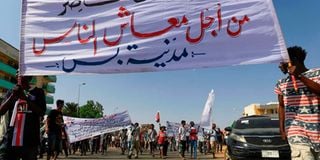Premium
Sudan’s protesters turn against a government they helped put up

Sudanese demonstrators carry banners as they protest in the capital Khartoum to demand the government's transition to civilian rule, on October 21, 2021.
Sudan’s transitional journey is facing new bumps as protesters turned on the government they helped put up two years ago.
This week, the protests arrived as Khartoum prepared the internal change of guard at the Transitional Sovereign Council from the military head to a civilian.
And yet sharp divisions emerged on Thursday this week as protesters demanded several things including that urgent handover of the transitional authority to civilians and the dissolution of the partnership with the military component in the government.
Thousands poured into Khartoum streets and other cities and held rallies they described as the “largest in the country’s history,” calling for civil transformation and rejecting any attempt to block the transitional calendar to a full civilian government.
Sea ports blocked
The protests have been injurious to the economy after main highways from the red sea ports were blocked for days, forcing imports to be rerouted.
The protesters have been supporting the Forces of Freedom and Change - National Charter Group, a coalition of civilian and professional bodies in the transitional government, who helped oust former leader Omar al-Bashir in April 2019.
Right from the start, when the military crossed the streets to join protesters that April, there had been curiosity as to whether the soldiers were supporting a transition from Bashir’s dictatorship or simply safeguarding their influence.
The protests now confirm the age-old tensions in the transitional government. The actual changeover from military to civilian head at the Council was in fact delayed by a year to November this year.
Whether that will happen now depends on manoeuvres of Prime Minister Abdallah Hamdok, the head of the transitional government. The Council’s leadership was supposed to alternate yearly until proper elections are held and a new civilian government is set up.
The protesters have demanded other things such as holding accountable the security forces who crushed a sit-in on June 3, 2019, and supporting the National Committee tasked with dismantling the former regime, including purging rogue leaders.
The marches came in response to the call launched by a gathering of more than 200 entities from the revolutionary groups.
Civilian reforms
But then two groups, one of them bigger in size chanted slogans for the civilian reforms, while other smaller groups, most of them parties and elements loyal to al-Bashir regime and a number of armed movements supported the military to take over in an apparent opposition to the purge.
Mr Hamdok said in a speech on October 21 that he supported the reforms and will stick to it.
And statements issued by the Resistance Committees in Khartoum State, the Sudanese Professionals Association and the Forces for Freedom and Change, called on the Sudanese people to come out and make it clear there won’t be debate on reforms needed.
These groups demanded the establishment of the Legislative Council, the Constitutional Court, the achievement of justice, and handover of the leadership of the Council to the civilian component by next month as the only guarantee to that reform promise.
The events have raised concerns in Western capitals. The United States, the UK and the European Union announced their strong support for transitional reforms and pledged to confront any coup attempts against civilian rule. Russia, on the other hand, rejected any foreign interference in Sudan.





